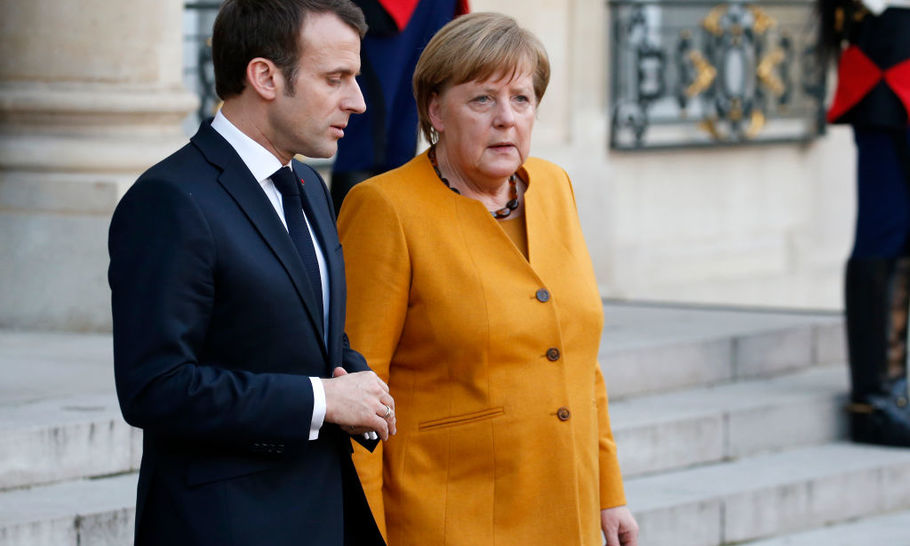Thank God for the Germans: they have thrown Theresa May a lifeline

(Photo by Chesnot/Getty Images)
The Germans have come to our rescue, Gott sei dank! Just as President Macron and a majority of other EU leaders were poised to impose Carthaginian terms on a helpless Theresa May, their unstoppable force met an immovable object: Angela Merkel.
For once, the German Chancellor lived up to her angelic name, by intervening on behalf of the British to put a stop to their humiliation. At the all-important banquet in Brussels, from which Mrs May was (as is now usual) excluded, things looked bad for the Prime Minister. If the French President had had his way, she would have been served up and eaten for dinner rather than breakfast.
Emmanuel Macron had appeared to be the only man with a plan, which he had made public in advance. (In retrospect, this was unwise: Berlin was watching.) He proposed that the UK be stripped of all the rights of an EU member and told to leave by next month, with or without a deal. In demanding an ultimatum, he was supported by his fellow countryman Michel Barnier, the EU Commission’s chief negotiator and putative next President. Macron was at his most messianic and his speech reportedly included the following passage: “I believe very deeply that we have a European renaissance to drive, and I do not want the subject of Brexit to come blocking us.”
Mrs Merkel’s reply has not yet been reported verbatim, but the gist is clear from the parting speech she delivered to the Bundestag before her departure. “This is an historic moment: for the first time a country is leaving the EU. How will we look back on this question five or ten years from now?”
The French President was not about to let the German Chancellor steal his thunder. “History will not judge us well if we allow Britain’s presence to get in the way of the EU and deeper European integration,” he told the assembled leaders.
But Mrs Merkel was not having any of it. As the daughter of a Lutheran pastor, she knows all about standing up to imperial pretensions. “Here I stand. I can do no other,” as Brother Martin once told the Emperor Charles V. Maybe she also feels a certain feminine solidarity with a British Prime Minister whose father was also a man of the cloth.
The German Chancellor has been influenced, less perhaps by Mrs May’s supplications on her flying visit to Berlin than by the warning voices of German economists, elder statesmen and business leaders. They have been telling her for some time that the British should not be humiliated, but rather “seduced”.
Günter Verheugen, the former German EU commissioner, castigated his former colleagues in the Daily Telegraph this week: “Brussels has taught us a lesson in how not to deal with a member state that wants to leave,” he told the paper’s correspondent Ambrose Evans-Pritchard. “The problem is not on the British side. The problem is on the EU side.” Like other members of the German elite, Verheugen fears that a post-Brexit Britain might turn its back on Europe, much to the detriment of both.
And so the French plan to force the pace on Brexit ran into resistance from the Germans. Mrs Merkel insisted that there should be no talk of reducing the UK to “intermediate membership” in the final communiqué. Nor would there be an extension so brief that it gave the British only two choices: ratify the deal or leave. She backed Donald Tusk’s plan for a much longer “flexible extension”, though his proposal of a year was reduced to six months. The date agreed was October 31.
Nor were there many strings attached. There was only one concession to French demands — but it was an important one. If Brexit hasn’t happened by next month, the British must hold elections to the European Parliament. If they don’t, then we must leave with no deal on June 1. Mrs May must have swallowed hard before agreeing to this condition, knowing that most of her party would hate the idea. But she had no real choice. The EU offer was better than she had had any right to expect— thanks to Mrs Merkel.
Now Parliament has been given a breathing space, it will have to finally make up its mind. The imminent prospect of electoral extinction in European elections next month should concentrate Tory minds wonderfully.
What of Mrs May? The Prime Minister has survived yet another near-death experience. She can legitimately claim that the extension offered by the EU was partly predicated on her promise to remain in office until the Withdrawal Agreement is ratified by Parliament. And so she lives to fight another day: unloved, indeed, but also undaunted.





